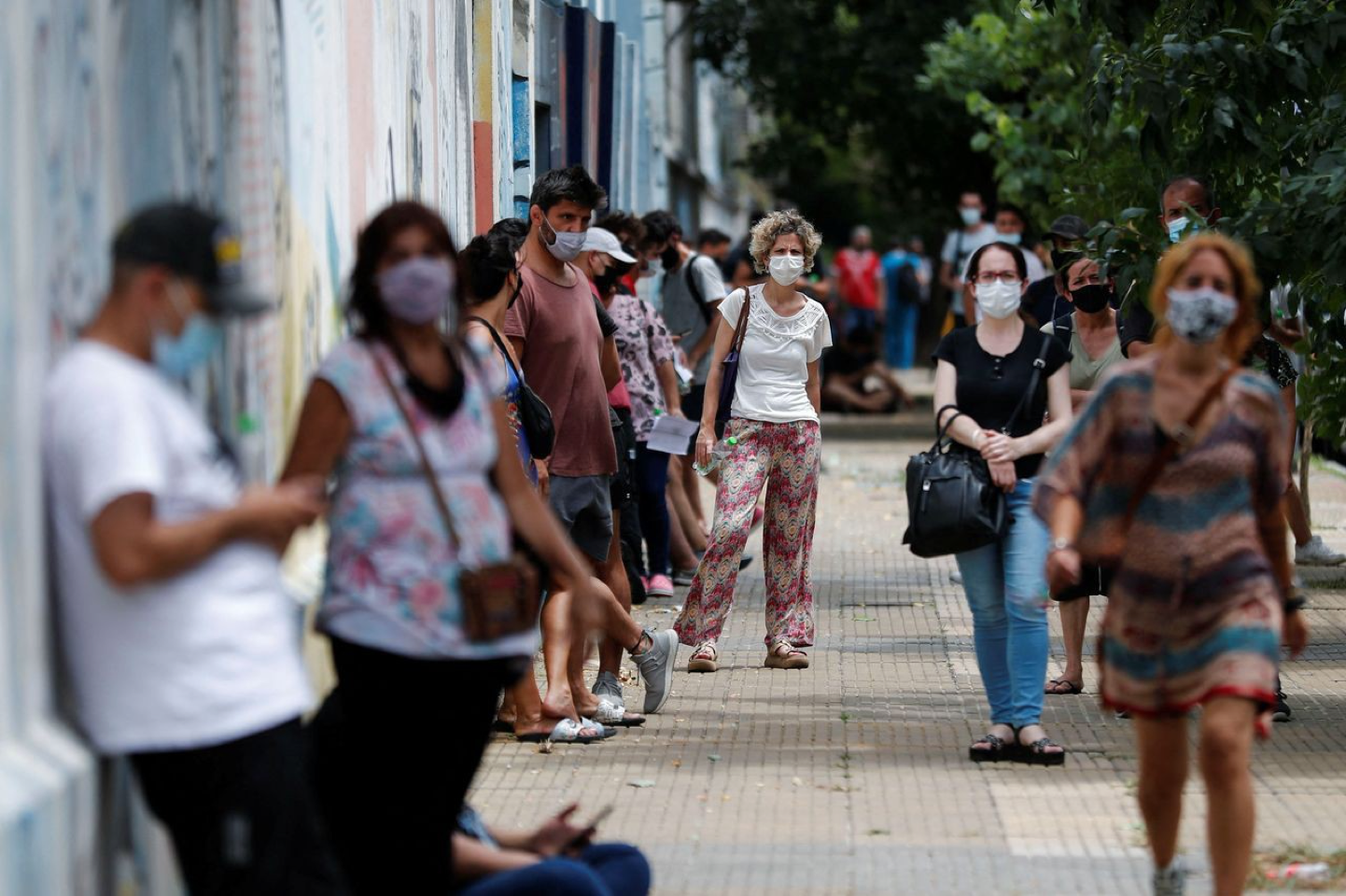Omicron has probably made more people ill at the same time than in any period since the flu pandemic, experts say
The world is living through a unique moment: In the past five or six weeks, the Omicron coronavirus variant has likely gotten more people sick than any similar period since the 1918-1919 flu pandemic, according to global health experts.
While Omicron infections have peaked in many places, February is likely to see similar case loads as the variant continues to spread before it flames out, causing worker shortages from hospitals to factories and spurring debate about Covid-19 restrictions, particularly since Omicron appears to be causing less serious illness.
In England, more than one in six residents are estimated to have caught the coronavirus since Omicron emerged in late November, surveys and modeling by the Office for National Statistics indicate. In Denmark, about one in five have caught the virus, and in Israel one in nine, authorities estimate.
“ This is an unbelievably unique moment when so many people get infected by a pathogen at the same time,” said Christopher Murray, the director of the University of Washington’s Institute for Health Metrics and Evaluation, which tracks global health.
Roughly one in five Americans had contracted Omicron by the mid-January peak, a number that could double by the time the surge ends in mid-February, Trevor Bedford, a virologist at the Fred Hutchinson Cancer Research Center, estimated. “Having ~40% of the population infected by a single pathogen in the span of 8 weeks is remarkable and I can’t think of an obvious modern precedent. Flu seasons generally have perhaps 10% infected in the span of 16 weeks,” he wrote on Twitter.
Unlike previous waves of the pandemic, which infected fewer people and often surged in different parts of the globe at different times, the current wave is largely world-wide, even if parts of Asia still haven’t seen a substantial Omicron outbreak.
SHARE YOUR THOUGHTS
How is Omicron affecting labor and the economy in your community? Join the conversation below.
To comment, you’ll need to be on WSJ.com
“If you don’t have friends infected right now, you don’t have friends,” Brenda Crabtree, a Mexican infectious-disease specialist, said on Twitter.
Not everyone who gets infected gets sick. The IHME estimates that as many as 80% to 90% of those infected may be asymptomatic, compared with about 40% with the Delta variant of the coronavirus and similar numbers for influenza. But that still likely leaves a record number of sick people in such a short period.
“Even if just 5% of those who got infected are sick, those are still very big numbers,” said Mr. Murray, adding that about 10% of his own university’s hospital—approximately 900 staff—were either out sick or tending to someone sick in mid-January. And influenza, while less prevalent than before the pandemic, is also circulating, adding to the rolls of the ill. The U.S. Centers for Disease Control and Prevention estimates two million Americans have had symptomatic flu so far this season, which began in October.
The impact on labor markets is threefold: Those who get sick, those who have to stay home to tend to sick family members, and those who are asymptomatic but test positive and have to stay home because of workplace and government guidelines.
As a result, unprecedented numbers of people who can’t work remotely are absent, which is hitting hospitals, airlines, schools and sporting events. In Brazil, up to one-fifth of healthcare staff called in sick last week in Rio de Janeiro state, which has also been hit by a flu outbreak. Between 10% and 13% of factory employees in Mexico have called in sick in recent weeks, according to estimates from Coparmex, the country’s largest industry chamber of commerce. “Some manufacturing firms have had up to 20% of the workforce out,” said Ricardo Barbosa, head of the labor committee at the chamber. “We’ve never seen anything like this.”
The scale and speed of Omicron’s spread make it comparable only to the 1918-1919 influenza pandemic, in terms of the percentage of the global population infected with the same virus in such a short period, said Dr. William Schaffner, a professor of infectious diseases at the University of Vanderbilt medical school.
“Obviously there have been other influenza pandemics that have occurred which we would think of as being close to this, but I think we’re playing in the major leagues here,” he said.
In January, there were more than 84 million positive Covid-19 cases world-wide, almost exactly the number of positive Covid-19 results during all of 2020, the year the pandemic got under way, according to numbers from Our World in Data. Fortunately, widespread vaccination, previous infection and better treatments kept the Covid-19-related death toll relatively low during the month, at 217,442.
Given that testing only captures a fraction of likely cases, however, as many as 95 million people a day around the world were likely catching Omicron in the early part of January, six times higher than the pandemic’s previous peak, according to IHME estimates. It forecasts a sharp decline in new infections over the next few weeks, with the global surge ending by mid-March.
In the first half of December, about three million people across the U.S. said they were at home from work either sick themselves or taking care of a sick family member, according to numbers tracked by the Census Bureau.
The workplace strains and the evidence that Omicron is less severe than earlier variants are prompting more governments to ease Covid-19 guidelines. The U.S. and U.K. have both reduced the isolation period for positive cases to five days from 10. Israel decided that students exposed to a confirmed case no longer need to miss in-person classes. In Dubai, authorities last week told healthcare workers exposed to the coronavirus that they don’t need to isolate if fully vaccinated and have no symptoms, state-backed media reported.
NEWSLETTER SIGN-UP
Coronavirus Briefing and Health Weekly
Get a morning briefing about the coronavirus pandemic three times a week and a weekly Health newsletter when the crisis abates.
S ome governments are going further, encouraged by the idea that the wave of current infections will add to immunity from vaccines and set the stage for a significant decline in infections in coming months, ushering in a new stage where Covid-19 becomes endemic like a seasonal flu. Denmark and France this week said they would scrap many Covid-19 restrictions.
The World Health Organization warned against easing restrictions too quickly. “We’re concerned that a narrative has taken hold in some countries that because of vaccines, and because of Omicron’s high transmissibility and lower severity, preventing transmission is no longer possible and no longer necessary,” WHO Director-General Tedros Adhanom Ghebreyesus said on Tuesday. “Nothing could be further from the truth. More transmission means more disease.”
Caroline Ball, an accountant in London, says she knows about 15 families currently infected with the virus—more than she has known of at any one time in the past two years. During two weeks in mid-January, her husband and three young sons tested positive for the virus days apart. Their symptoms ranged from fever and fatigue to no sign of illness at all.
“Especially with Omicron and the boys being at school, it did feel like our time was going to come,” she said. Children under 12 aren’t routinely eligible for Covid-19 vaccines in the U.K.
Hospitals have been most affected by the surge, with more patients and fewer staff. Staff out sick with Covid-19 in English hospitals peaked in early January at almost 50,000, before the government reduced the isolation period for positive cases to five days with two negative test results, according to data from the National Health Service. More than a third of staff at one of Argentina’s largest public hospitals, Hospital General Durand, were out sick or looking after sick family members, hospital officials say.
São Paulo, Brazil’s largest city, hired several hundred new health workers to cope with staff absences. A local judge filed an injunction in mid-January preventing emergency-care health workers in São Paulo from going on strike after they planned walkouts this week over staff shortages.
“Everyone is exhausted…the biggest risk is that we get to a point where the system collapses,” said Victor Vilela Dourado, an anesthetist from São Paulo and head of the city’s doctors union.
In São Paulo, more than 600 bank branches temporarily closed in recent weeks because of lack of staff, according to the banking association. About 20% of workers at Brazilian bars and restaurants across the country have been sent home since December, according to the local industry association. Argentina’s state-run airline Aerolineas Argentinas said one-tenth of its 11,000 employees were out sick in mid-January, causing scores of flights to be canceled.
The virus has also hit the world of sports. About 21 Premier League games have been called off because of Covid-19 infections in the U.K. in the past month, far more than the six total games postponed in the 2020-21 season. Argentina’s soccer season is getting under way late because so many players are testing positive. India was forced out of the Women’s Asian Cup soccer tournament after a dozen Covid-19 cases among players.
New Delhi banker Abhishek Sharma is one of millions world-wide now faced with backed-up healthcare services. He kept trying to contact his family’s longtime pediatrician Sameer Maqsood after the banker’s 8-year-old came down with flulike symptoms. But the doctor wasn’t answering his phone or responding to texts. In desperation, Mr. Sharma drove to the doctor’s clinic in east Delhi and found a long line of sick children waiting. The doctor said he was forced to ignore his phone for the first time in two decades because of so many patients.
“Looks like everyone is falling sick,” the banker quoted Dr. Maqsood as saying.
— Luciana Magalhaes in São Paulo, Silvina Friedlewsky in Buenos Aires and Dov Lieber in Tel Aviv contributed to this article.



